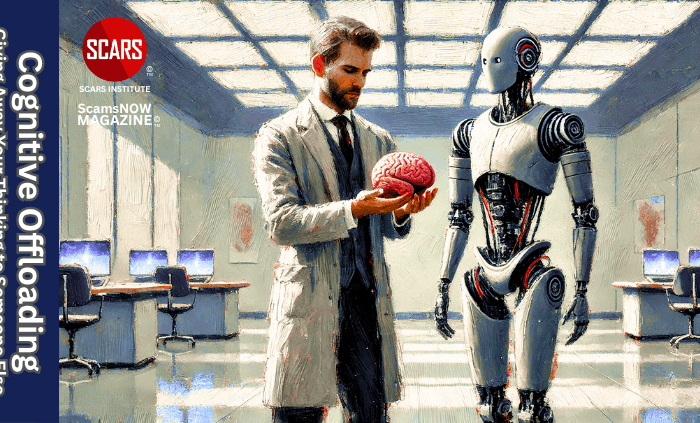What Is Faith And Why It Matters In Scam Victim Recovery
Helping Scam Victims to Find the Path To Recovery
Scam Victim Recovery
Author:
• Tim McGuinness, Ph.D. – Anthropologist, Scientist, Director of the Society of Citizens Against Relationship Scams Inc.
About This Article
This explores the role of faith in the recovery of scam victims, distinguishing between faith in oneself and religious faith. It discusses the profound impact of relationship scams on victims’ trust and self-worth, leading to feelings of betrayal and despair.
It highlights faith as a powerful antidote to this despair, emphasizing resilience and belief in positive outcomes. Faith in oneself reaffirms victims’ agency and empowers them to navigate the journey of recovery with determination. Ultimately, the article underscores the transformative potential of faith in guiding victims toward healing and renewal amidst the challenges of scam recovery.
The Power of Faith: Accepting Challenges and Embracing the Unknown In Scam Victim Recovery
This is an article that , we hope, is going to challenge you if you are a scam victim because faith is both a destructive negative coping mechanism and it is the essential component in being able to move forward.
Faith vs. FAITH
Faith in oneself and in one’s principles is rooted in personal conviction, core belief, and confidence in one’s abilities, values, and moral compass.
It is an internalized sense of trust and assurance that guides individuals in navigating life’s challenges, making decisions, and pursuing their goals. This type of faith is grounded in self-awareness, introspection, and a deep understanding of one’s strengths, weaknesses, and aspirations. It empowers individuals to persevere in the face of adversity, to stay true to their core values, and to cultivate a sense of purpose and meaning in their lives.
On the other hand, religious faith typically involves a belief in and devotion to a higher power, deity, or spiritual doctrine.
It is often based on teachings, scriptures, rituals, and traditions passed down through generations within a religious community. Religious faith encompasses a broader set of beliefs and practices that provide individuals with a framework for understanding the world, interpreting their experiences, and finding solace, guidance, and connection with something greater than themselves. While faith in oneself and in one’s principles is more focused on personal agency and empowerment, religious faith often involves surrendering to divine will or seeking divine intervention in one’s life.
Notice that last element of that! Surrendering to a higher power.
We do not want to speak about any religious faith or the value that it has to anyone, but when it comes to recovering from a relationship scam, surrendering your agency to anyone or anything can be dangerous. It can increase shame, self-blame, and guilt substantially, while at the same time, removing agency and responsibility for your actions. After all, it was GOD’s plan that all this happened. Even the scammers were a part of that plan. If that is so, why not just accept that this was meant to happen?
We do know that spiritual faith can have powerful healing benefits as long as the scam victim understands that what happened was because a criminal chose to victimize them and that they made the mistake of talking to a stranger. Everything that followed was the scammer’s plan, You are not to blame, the scammer is.
At its Core
This kind of faith, rooted in personal principles and commitments, is a deeply intrinsic belief system that transcends religious affiliation. It embodies a profound trust in oneself, in one’s values, and in the capacity to navigate life’s uncertainties with resilience and determination. Unlike religious faith, which often involves adherence to specific doctrines or the worship of a higher power, this kind of faith is grounded in individual convictions and a moral compass.
At its core, this faith is about embracing the unknown with a sense of optimism and hope, even in the absence of guarantees or certainties. It is about finding the courage to move forward, guided by one’s inner principles and a belief in the possibility of positive outcomes. This faith empowers individuals to confront challenges head-on, to persevere in the face of adversity, and to trust in the inherent goodness of humanity and the universe. It is a deeply personal and transformative journey of self-discovery and growth, where individuals draw strength from within to overcome obstacles and realize their full potential.
Uncertainty, Hope, and Faith Moving Forward
In this journey of life, where uncertainty looms large and the future remains shrouded in mystery, faith in our future emerges as a beacon of hope, guiding us through the darkest of times and empowering us to move forward with sometimes wavering resolve. Yet, while faith holds the promise of transformation and growth, it is not without its challenges and trials.
At its essence, faith requires us to confront our deepest fears and doubts and to step into the unknown with courage and conviction. It demands that we relinquish the comfort of the familiar and embrace the discomfort of uncertainty, trusting that our beliefs and principles will guide us through the tumultuous waters ahead. But we all must be careful because cognitive biases can easily be confused as faith – some of the worst atrocities in history were predicated on faith, which in reality were biases.
Faith, Adversity, and Setbacks
One of the greatest challenges of faith lies in the face of adversity and setbacks. When our beliefs are tested and when the path ahead is fraught with obstacles, it can be all too easy to succumb to doubt and despair. In those moments, faith calls upon us to dig deep within ourselves, draw upon our inner strength and resilience, and persevere in the face of adversity.
More than that, faith requires us to confront our own limitations and insecurities, and to acknowledge our vulnerabilities and imperfections. It challenges us to confront the voices of self-doubt and criticism that whisper in the recesses of our minds, urging us to retreat to the safety of the known. Yet, it is precisely in those moments of vulnerability that our faith is truly tested, and our capacity for growth and transformation is revealed.
Faith and Inherent Uncertainty
Another challenge of faith lies in its inherent uncertainty. Unlike blind certainty or dogmatic belief, faith is a dynamic and ever-evolving process. It requires us to navigate the complexities of life with humility, gratitude, and openness, to embrace the uncertainty of the journey, and to trust in our guides and in the wisdom of the unknown.
This kind of faith demands that we confront our deepest fears and insecurities, to confront the possibility of failure and disappointment. It requires us to acknowledge the inherent risks and uncertainties of life and to embrace them with courage and resilience.
Yet, for all its challenges, faith holds the promise of profound transformation and growth. It is through the trials and tribulations of life that our faith in ourselves is truly tested, and our capacity for resilience and perseverance is strengthened if we can live up to our faith. It is through the uncertainties of the unknown that we discover our true potential and find the courage to embrace the limitless possibilities of the future.
In the end, faith is not about having all the answers or knowing what lies ahead. It is about trusting in ourselves, our principles, our clear mind, and our ability to work through the complexities of life with courage and conviction. It is about embracing the uncertainties of the journey and finding solace in the knowledge that we are guided by our own inner compass and the belief that everything will ultimately unfold according to plan. But as we said, faith can easily be confused for not-faith – shame, biases, and the toxic voices that would lead us away from the right path. To know the difference we must listen to our true faith and find the courage to go forward.
As we navigate the challenges of life, let us remember that faith is not a destination, but a journey. It is a journey of self-discovery and growth, of courage and resilience, of hope and transformation. And it is through this journey that we find the courage to let go of the past and embrace the limitless possibilities of the future.
Faith and the Relationship Scam Victim
Relationship scammers wield a devastating impact on individuals’ faith in themselves and in others. By preying on the innate desire for connection and companionship, they exploit vulnerabilities and manipulate emotions, leaving behind a trail of broken trust and shattered beliefs.
Victims of relationship scams often find themselves grappling with profound feelings of betrayal, self-doubt, and disillusionment, as the very foundation of their faith in humanity is eroded. These scams, which prey on individuals seeking companionship and connection, manipulate victims into trusting someone who ultimately exploits their vulnerability for personal gain. The realization that the affection, attention, and promises were nothing more than deceitful tactics can shatter victims’ trust not only in the scammer but also in themselves and others.
The aftermath of such scams leaves victims questioning their judgment, their ability to discern truth from fiction, and their capacity to trust again. They may experience intense feelings of shame, embarrassment, and isolation, as they struggle to come to terms with being deceived and manipulated. Plus, the financial losses incurred can exacerbate the sense of betrayal, leaving victims feeling not only emotionally violated but also financially devastated. As they attempt to rebuild their lives and recover from the trauma, victims may find it challenging to reestablish their faith in humanity, fearing that they will be taken advantage of again.
The aftermath of a relationship scam can be deeply traumatic, as victims confront the harsh reality of being deceived and exploited by someone they believed to be genuine and trustworthy. The emotional toll of such an experience can be overwhelming, leading to a loss of confidence in one’s judgment, a fear of opening up to others, and a pervasive sense of isolation and loneliness.
Rebuilding faith and trust after such a profound betrayal is a Herculean task, requiring immense resilience, support, and self-reflection to overcome the scars left behind by these manipulative predators.
Hopelessness and Despair
These scams can exacerbate the sense of hopelessness and despair in scam victims by inflicting significant emotional, financial, and psychological harm. Beyond the immediate shock of realizing they have been deceived, victims often face a daunting road to recovery, grappling with the aftermath of their exploitation. The financial losses incurred can lead to a profound sense of despair, especially if victims lose their life savings or fall into debt as a result of the scam. This financial strain may further exacerbate feelings of hopelessness, as victims struggle to regain their financial stability and security.
Also, the emotional toll of being manipulated and betrayed by someone they trusted can deeply impact victims’ mental well-being. They may experience a range of emotions, including anger, grief, and profound sadness, as they come to terms with the betrayal. Victims may also struggle with feelings of powerlessness and helplessness, questioning their own agency and ability to protect themselves from harm. This sense of despair can be compounded by the realization that the scammer’s actions were driven solely by greed and exploitation, with little regard for the devastating impact on their victims’ lives.
Additionally, the psychological effects of the scam can linger long after the initial betrayal, leading to ongoing feelings of anxiety, depression, and trauma. Victims may struggle to trust others or form new relationships, fearing that they will be deceived and exploited again. This sense of isolation and mistrust can further isolate victims, exacerbating feelings of despair and loneliness. Overall, the profound sense of hopelessness and despair experienced by scam victims underscores the urgent need for support, empathy, and resources to help them rebuild their lives and regain a sense of control and agency.
Faith as the Antidote
Faith can serve as a powerful antidote to the hopelessness and despair experienced by scam victims. While the betrayal and trauma inflicted by these scams can shake victims to their core, faith in oneself, one’s principles and the possibility of a positive outcome can provide a shining beacon of hope in the darkness. This kind of faith is rooted in resilience, inner strength, and the belief that even in the face of adversity, one has the capacity to overcome challenges and emerge stronger on the other side.
First and foremost, faith in oneself and one’s principles reaffirms a sense of self-worth and agency. It empowers victims to reclaim their narrative, recognizing that they are not defined by their victimization but by their resilience and capacity to heal. By holding fast to their core values and convictions, scam victims can make sense of the complexities of recovery with a sense of purpose and determination, refusing to let the actions of scammers undermine their fundamental beliefs.
Applied well, faith instills a sense of real optimism (not the optimism bias) and possibility, reminding scam victims that even in their darkest moments, there is always the potential for growth, transformation, forward movement, and renewal. It encourages them to look beyond their immediate circumstances and envision a brighter future, filled with real hope, the possibility of joy, and new meaningful connections.
This kind of faith is not about denying the reality or letting biases or other coping mechanisms take control, or pretending that the pain and suffering caused by the scam never happened, but rather about embracing the inherent resilience of the human spirit and trusting in its capacity to overcome even the most daunting challenges.
Remember
Our true faith serves as a guiding light that illuminates the path forward, offering solace, strength, and courage to those who have been victimized by scams.
It reminds all of us that we are not alone in our journey and that with faith as our compass, we can navigate the stormy seas of recovery and emerge as survivors on the other side.
Just remember that false faith and hope are destructive. The challenge is to find the path to your true self but it may take rebuilding for you to recognize it again!
Please Rate This Article
Please Leave Us Your Comment
Also, tell us of any topics we might have missed.
Leave a Reply
Thank you for your comment. You may receive an email to follow up. We never share your data with marketers.
-/ 30 /-
What do you think about this?
Please share your thoughts in a comment above!
More Related Information:
- Scam Victims In The RAIN – A Mindfulness Approach For Recovery – 2024 (scamsnow.com)
- Actionable Steps For Scam Victims To Create Resilience & Recover After A Scam 2024 (scamsnow.com)
- Scam Victims Will Never Be The Same – A Harsh Truth – 2024 (scamsnow.com)
- Coping with Scam Victim Trauma: Exploring Positive and Negative Coping Mechanisms – 2024 (scamsnow.com)
- Cognitive Biases Catalog 2024 (romancescamsnow.com)
- Why It Is Important To Understand The Default Mode (DMN) And The Subconscious In Scam Victims – 2024 (scamsnow.com)
- Overconfidence And Scam Victims’ Susceptibility To Scams – 2024 (scamsnow.com)
- 7 Deadly Sins of Post Scam Victim Vulnerability (romancescamsnow.com)
- Signs of Good & Bad Scam Victim Emotional Health (romancescamsnow.com)
- Psychology of Scams: Immediate and Delayed Reactions to Trauma (romancescamsnow.com)
- Scam Victims Suppressing Trauma Or Avoiding Recovery And Healing 2024 (scamsnow.com)
-/ 30 /-
What do you think about this?
Please share your thoughts in a comment above!
SCARS LINKS: AgainstScams.org RomanceScamsNOW.com ContraEstafas.org ScammerPhotos.com Anyscam.com ScamsNOW.com
reporting.AgainstScams.org support.AgainstScams.org membership.AgainstScams.org donate.AgainstScams.org shop.AgainstScams.org
youtube.AgainstScams.org linkedin.AgainstScams.org facebook.AgainstScams.org
ARTICLE RATING
TABLE OF CONTENTS
CATEGORIES
MOST POPULAR COMMENTED ARTICLES
POPULAR ARTICLES
U.S. & Canada Suicide Lifeline 988
![NavyLogo@4x-81[1]](https://scamsnow.com/wp-content/uploads/2025/04/NavyLogo@4x-811.png)
ARTICLE META
WHAT PEOPLE ARE TALKING ABOUT LATEST SITE COMMENTS
See Comments for this Article at the Bottom of the Page
on Substance Abuse Susceptibility And Scam Victims – 2024: “It is understandable how some would feel that alcohol or substance abuse would be helpful in handling their feelings after…” Jul 1, 20:36
on Scam Victims Use Work To Avoid Healing: “The last 6 years have been the most difficult of my life. The pandemic, having both parents in the hospital…” Jun 29, 18:38
on Entitlement Mentality And How Scam Victims Often Lose Their Path To Recovery – 2024: “Thank you for this discussion of entitlement. I can see from the descriptions listed that I have not felt entitlement.…” Jun 29, 18:22
on Samurai Wisdom and Rituals for Clearing the Mind After Scam Trauma – 2025 – [VIDEOS]: “A great guide on how to move forward in our recovery process with a calm mind, cleansed on an ongoing…” Jun 28, 07:34
on Delayed Gratification and Patience in Scam Victim Recovery – 2025 – [VIDEOS]: “We want to recover quickly and… we make new mistakes. How not to speed up the recovery process, how to…” Jun 28, 06:41
on The Unique Injury Of Betrayal Trauma On Scam Victims – 2024: “Primarily because you did not see it coming” Jun 27, 23:57
on Changes In A Scam Victim’s Life: “I really detest the way my trust in others has been affected by the scamming I went through. I used…” Jun 27, 14:47
on The Unique Injury Of Betrayal Trauma On Scam Victims – 2024: “Betrayal Trauma is the worst feeling ever. Why does it seem so much worse when a scammer does that to…” Jun 27, 14:34
on EMDR Therapy For Scam Victims’ Trauma – A Part Of The Recovery Process For Many – 2024: “Very comprehensive article explaining all aspects of EMDR. I’d only heard of it before and now I have a much…” Jun 26, 19:01
on Forgiving Yourself After Surviving a Romance or Investment Scam – 2025: “Thank you for this valuable article. Self-forgiveness was for me the biggest step that led to my recovery. That also…” Jun 26, 17:28
on Counseling And Your Native Language: “These points make perfect sense. I can’t imagine trying to express complex emotions in a second language. I realize many…” Jun 26, 16:05
on Thought-Terminating Cliches – How What You and Others Say Stops Critical Thinking and Recovery for Scam Victims – 2025: “I didn’t realize that these “innocent phrases” clichés ending thoughts, can have such effect / negative -inhibiting / on our…” Jun 26, 14:48
on Scam Victim Resistance In Support Groups Therapy Or Counseling Can Destroy Opportunities For Recovery – 2024: “Working with either a support group or therapist to me means a self commitment to actively participating in the therapy.…” Jun 24, 21:01
on ‘I Just Want To Forget It’ – Denial & Avoidance Are Natural But Will Not Help Scam Victims On Their Path To Recovery From Scams – 2024: “My financial loss, the shock and betrayal of the crime ending all combined to fray my nerves and spend hours…” Jun 24, 20:10
on You Hate Being Told What To Do? How Your Rebellious Mentality Can Sabotage Your Recovery – 2025: “I am a bit of a rebel, and the moment someone tells me to do something, worse, does it even…” Jun 24, 15:04
on You Hate Being Told What To Do? How Your Rebellious Mentality Can Sabotage Your Recovery – 2025: “You are very welcome” Jun 24, 03:01
on You Hate Being Told What To Do? How Your Rebellious Mentality Can Sabotage Your Recovery – 2025: “This is a great article, which makes perfect sense as to why anyone would resist the help offered to them.…” Jun 23, 20:01
on Scam Victims’ Responsibilities – 2021 [Updated 2025]: “Thank you for this article. As I continue my journey, I focus on the here and now and let the…” Jun 21, 16:26
on Scam Victims Avoid Or Escape The Aftermath Of Scams – How Denial And Distraction Avoid Confronting Reality – 2024: “In the earliest days after my crime I felt powerless, helpless and weak. I had been through so much in…” Jun 21, 14:46
Important Information for New Scam Victims
Please visit www.ScamVictimsSupport.org – a SCARS Website for New Scam Victims & Sextortion Victims
SCARS Institute now offers a free recovery program at www.SCARSeducation.org
Please visit www.ScamPsychology.org – to more fully understand the psychological concepts involved in scams and scam victim recovery
If you are looking for local trauma counselors, please visit counseling.AgainstScams.org
If you need to speak with someone now, you can dial 988 or find phone numbers for crisis hotlines all around the world here: www.opencounseling.com/suicide-hotlines
Statement About Victim Blaming
Some of our articles discuss various aspects of victims. This is both about better understanding victims (the science of victimology) and their behaviors and psychology. This helps us to educate victims/survivors about why these crimes happened and not to blame themselves, better develop recovery programs, and help victims avoid scams in the future. At times, this may sound like blaming the victim, but it does not blame scam victims; we are simply explaining the hows and whys of the experience victims have.
These articles, about the Psychology of Scams or Victim Psychology – meaning that all humans have psychological or cognitive characteristics in common that can either be exploited or work against us – help us all to understand the unique challenges victims face before, during, and after scams, fraud, or cybercrimes. These sometimes talk about some of the vulnerabilities the scammers exploit. Victims rarely have control of them or are even aware of them, until something like a scam happens, and then they can learn how their mind works and how to overcome these mechanisms.
Articles like these help victims and others understand these processes and how to help prevent them from being exploited again or to help them recover more easily by understanding their post-scam behaviors. Learn more about the Psychology of Scams at www.ScamPsychology.org
SCARS INSTITUTE RESOURCES:
If You Have Been Victimized By A Scam Or Cybercrime
♦ If you are a victim of scams, go to www.ScamVictimsSupport.org for real knowledge and help
♦ Enroll in SCARS Scam Survivor’s School now at www.SCARSeducation.org
♦ To report criminals, visit https://reporting.AgainstScams.org – we will NEVER give your data to money recovery companies like some do!
♦ Follow us and find our podcasts, webinars, and helpful videos on YouTube: https://www.youtube.com/@RomancescamsNowcom
♦ Learn about the Psychology of Scams at www.ScamPsychology.org
♦ Dig deeper into the reality of scams, fraud, and cybercrime at www.ScamsNOW.com and www.RomanceScamsNOW.com
♦ Scam Survivor’s Stories: www.ScamSurvivorStories.org
♦ For Scam Victim Advocates visit www.ScamVictimsAdvocates.org
♦ See more scammer photos on www.ScammerPhotos.com
You can also find the SCARS Institute on Facebook, Instagram, X, LinkedIn, and TruthSocial
Psychology Disclaimer:
All articles about psychology and the human brain on this website are for information & education only
The information provided in this and other SCARS articles are intended for educational and self-help purposes only and should not be construed as a substitute for professional therapy or counseling.
Note about Mindfulness: Mindfulness practices have the potential to create psychological distress for some individuals. Please consult a mental health professional or experienced meditation instructor for guidance should you encounter difficulties.
While any self-help techniques outlined herein may be beneficial for scam victims seeking to recover from their experience and move towards recovery, it is important to consult with a qualified mental health professional before initiating any course of action. Each individual’s experience and needs are unique, and what works for one person may not be suitable for another.
Additionally, any approach may not be appropriate for individuals with certain pre-existing mental health conditions or trauma histories. It is advisable to seek guidance from a licensed therapist or counselor who can provide personalized support, guidance, and treatment tailored to your specific needs.
If you are experiencing significant distress or emotional difficulties related to a scam or other traumatic event, please consult your doctor or mental health provider for appropriate care and support.
Also read our SCARS Institute Statement about Professional Care for Scam Victims – click here
If you are in crisis, feeling desperate, or in despair, please call 988 or your local crisis hotline.
More ScamsNOW.com Articles
A Question of Trust
At the SCARS Institute, we invite you to do your own research on the topics we speak about and publish. Our team investigates the subject being discussed, especially when it comes to understanding the scam victims-survivors’ experience. You can do Google searches, but in many cases, you will have to wade through scientific papers and studies. However, remember that biases and perspectives matter and influence the outcome. Regardless, we encourage you to explore these topics as thoroughly as you can for your own awareness.















![scars-institute[1]](https://scamsnow.com/wp-content/uploads/2025/04/scars-institute1.png)
![niprc1.png1_-150×1501-1[1]](https://scamsnow.com/wp-content/uploads/2025/04/niprc1.png1_-150x1501-11.webp)

This article validates all that I felt in the first few months after the scam ended. I had zero faith in my ability to trust anyone, including myself. The overwhelming devastation caused by the betrayal and deceit drove me into isolation. I didn’t want to talk to anyone about what happened. The fear of judgement from others was too great. As I healed a bit, I told a few family members and thankfully they were supportive and withheld judgement, at least to my face.
As the months went by I began to regain faith in myself – in the sense that I believed one day I could trust my own judgment. I have a lot of healing left in order to achieve that, but I do believe it will happen. And as I hear the stories of other “seasoned” scam survivors, I’m inspired and hopeful that I too can become a survivor and thriver.
This is a good article giving examples of the difference between faith in oneself and one’s core values – to bolster resilience and confidence and FAITH in the true power of God. Not faith in religion but FAITH in God and His Word. With God ALL things are possible, but putting one’s faith in man leaves one feeling unfulfilled, incapable, small, unnoticed. Yet as humans on this earth we are faced with both forms of faith. So, the best way I can look at this subject is: I learned how to become an accountant, I learned the pathways and byways of my work. On my own I established how to spot inconsistencies, mistakes, errors in arithmetic. And I have been very successful in my life’s work by establishing my own mantra that an accountant is only as good as their word. But there is an always present even if unacknowledged possibility to set aside one’s belief in following the rules and staying true to your convictions and the temptation of even taking one penny, forgetting and placing a company pen in one’s pocket or delaying making a deposit. That is man’s faith.
With FAITH we learn we are forgiven by God through FAITH and grace. We believe that confessing sin and asking God for help to withstand the temptation of sin we can overcome sin.
Both faith and FAITH are essential to our recovery. Faith in our ability, will enable us to restore trust in others, faith that SCARS will be there for us and will aid us in education and recovery. But FAITH helps us to learn to turn from the temptation of the scam, of scambaiting, doomscrolling, endless obsession on the scammer, shame, guilt, failure, gullibility and instead walk forward in that same FAITH and faith toward forward motion and light.
In religious belief, do you believe that faith is also used as tools/technique to fool/scam, and sexually exploit people?
Excellent explanation of Faith vs. FAITH! I have faith in myself that I will eventually heal from my trauma.There will always be a scars to remind me that the scam did happen. But gaining an understand of what happened through the help of SCARS Institute, gave me the chance to make necessary behavioral changes to protect myself from harm and to prevent a repeat of the scam.
Excelente artigo sobre os caminhos da fé no pós-trauma
Very inspirational article. I always like the ones with the feel good endings.
In my darkest hour, after the scam ended, I remembered what I was told by a family member when I shared that I was scammed. He told me that for God, my sad situation was so little in comparison with His almighty power. That the money lost, was nothing to worry, about as God is the owner of everything In the universe and that the same way it was given to me, it will come back one way or the other.
Having faith helped me to give myself a chance to stand up straight and to fight for my recovery, knowing God was there with me every step of the way. I can say, the experience of being scammed and the struggle caused by the financial aftermath, had humbled me tremendously. I see things in a total different way now. I am grateful because every single day, after loosing it all, I had a plate of food on my table, a roof over my head, a bed to sleep on, water to shower and air to breathe and so many other blessings, that before I took for granted. This experience had made me a better person for sure.